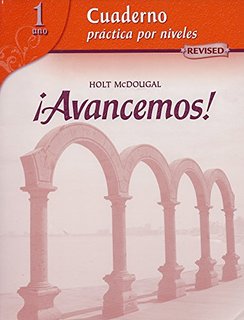
All Solutions
Page 321: Gramatica A
Remember that **the verb matches the subject in person and number.**
*(Fabiana **fue**…)*
Fabiana is third-person singular, so we used the third-person singular form of the verb *ir (to go)*, which is **”fue.”**
*(Fabiana y yo **hicimos**…)*
The subject is first-person plural (we), so we used the first-person plural form of the verb *hacer *(to do)*, which is **”hicimos.”**
*The verb *hacer* normally means *to do*, but here, it has the meaning *to make* because it is part of an expression *hacer una llamada (to make a call).*
*(Adrian and Fabiana **hicieron**…)*
The subject is third-person plural (they), so we used the third-person plural form of the verb *hacer (to do)*, which is **”hicieron.”**
*(Subir a la vuelta al mundo **fue**…)*
The subject is third-person singular (it), so we used the third-person singular form of the verb *ser (to be)*, which is **”fue.”**
Note that the verbs *ir (to go)* and *ser (to be)* have the same conjugation in the preterite.
*(¿Tú **fuiste**…)*
The subject is second-person singular (you), so we used the second-person singular form of the verb *ser (to be)*, which is **”fuiste.”**
Remember that **the verb matches the subject in person and number.**
Note that the verbs *ir (to go)* and *ser (to be)* have the same conjugation in the preterite.
*(Fabiana **fue** muy…*(ser)*)*
Fabiana is third-person singular, so we used the third-person singular form of the verb *ser (to be)*, which is **”fue.”**
*(Fabiana y Josefina **fueron**… (ir))*
The subject is third-person plural (they), so we used the third-person plural form of the verb *ir (to go)*, which is **”fueron.”**
*(¿Tú **fuiste**…?(ser))*
The subject is second-person singular (you), so we used the second-person singular form of the verb *ser (to be)*, which is **”fuiste.”**
*(¿Qué **hicieron** ustedes…? (hacer))*
The subject is second-person plural (you), so we used the second-person plural form of the verb *hacer (to do)*, which is **”hicieron.”**
*(Pablo **hizo**… (hacer))*
The subject is third-person singular (he), so we used the third-person singular form of the verb *hacer (to do)*, which is **”hizo.”**
*( Fabiana, Pablo y yo **fuimos**… (ir))*
The subject is first-person plural (we), so we used the first-person plural form of the verb *ir (to go)*, which is **”fuimos.”**
*(…, ellos **hicieron** las tareas. (hacer))*
The subject is third-person plural (they), so we used the third-person plural form of the verb *hacer (to do)*, which is **”hicieron.”**
*(**Fue** muy … (ser))*
The subject is third-person singular (it), so we used the third-person singular form of the verb *ser (to be)*, which is **”fue.”**
Since the events are set in the past (last Saturday), you should use the preterite.
*(I went to my friend’s house last Saturday.)*
The subject is first-person singular, so we used the first-person singular form of the verb *ir (to go)*, which is **”fui.”**
*(I was diligent last Saturday.)*
The subject is first-person singular, so we used the first-person singular form of the verb *ser (to be)*, which is **”fui.”**
*(I did homework last Saturday.)*
The subject is first-person singular, so we used the first-person singular form of the verb *hacer (to do)*, which is **”hize.”**

